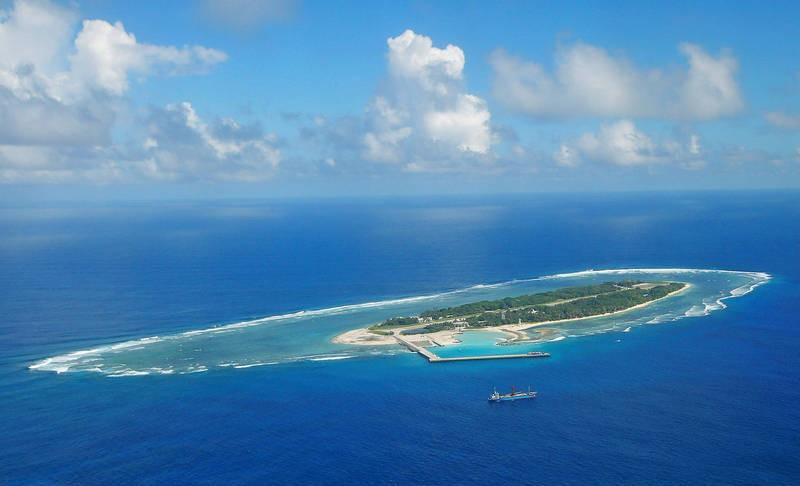Minister of National Defense Chiu Kuo-cheng (邱國正) on Monday said that US and Chinese naval ships had sailed within 12 nautical miles (22.22km) of Itu Aba Island (Taiping Island, 太平島), contradicting earlier statements by the coast guard.
Media have reported that the vessels on Nov. 3 passed near Itu Aba, the largest of the South China Sea Spratly Islands.
Ocean Affairs Council Minister Kuan Bi-ling (管碧玲) in a Facebook post on Nov. 6 said that no foreign vessels had encroached on the island’s territorial waters.

Photo: Reuters
A week later, Jia Chih-kuo (賈治國), deputy head of the Coast Guard Administration’s patrol, reiterated the denial at a news conference held by Chinese Nationalist Party (KMT) Legislator Charles Chen (陳以信) accusing the coast guard of lying about the intrusions.
During a session of the legislature’s Foreign and National Defense Committee on Monday, Chen asked Chiu whether the military had detected the vessels, adding that foreign media had satellite evidence of the transit.
Chiu confirmed that the military had detected the vessels on both radar and satellite.
Lieutenant General Liu Pei-chih (劉沛智), deputy chief of the General Staff for personnel, said that the US and Chinese vessels were sailing near each other, adding that “we really do have a handle on it.”
Chen again accused the coast guard of lying, saying that officials assured him that the vessels had only sailed within 13 nautical miles, not within the 12-nautical-mile boundary.
The military cannot make any concessions on national sovereignty, as failing to protest could enable other claimants to cite the legal principle of estoppel in preventing Taiwan from acting against what it did before, he said.
“Protecting sovereignty is our responsibility,” Chiu said. “Radar did indeed detect [the vessels], contrary to the coast guard.”

A strong continental cold air mass is to bring pollutants to Taiwan from tomorrow, the Ministry of Environment said today, as it issued an “orange” air quality alert for most of the country. All of Taiwan except for Hualien and Taitung counties is to be under an “orange” air quality alert tomorrow, indicating air quality that is unhealthy for sensitive groups. In China, areas from Shandong to Shanghai have been enveloped in haze since Saturday, the ministry said in a news release. Yesterday, hourly concentrations of PM2.5 in these areas ranged from 65 to 160 micrograms per cubic meter (mg/m³), and pollutants were

Taiwan’s armed forces have established response protocols for a wide range of sudden contingencies, including the “Wan Chun Plan” to protect the head of state, the Ministry of Defense (MND) said today. After US President Donald Trump on Saturday launched a series of airstrikes in Venezuela and kidnapped Venezuelan President Nicolas Maduro, concerns have been raised as to whether China would launch a similar “decapitation strike” on Taiwan. The armed forces regularly coordinate with relevant agencies and practice drills to ensure preparedness for a wide range of scenarios, Vice Minister of National Defense Hsu Szu-chien (徐斯儉) told reporters before a

EVA Airways on Saturday said that it had suspended a pilot and opened an investigation after he allegedly lost his temper and punched the first officer several times as their plane was taxiing before takeoff at Los Angeles International Airport. According to a report published on Thursday by The Reporter, the incident occurred after the flight’s Malaysian first officer tried to warn the Taiwanese pilot, surnamed Wen (文), that he was taxiing faster than the speed limit of 30 knots (55.6kph). After alerting the pilot several times without response, the first officer manually applied the brakes in accordance with standard operating

NOT AN OPENING: Trump’s violation of international law does not affect China’s consideration in attacking Taiwan; Beijing lacks capability, not precedent, an official said Taiwanese officials see the US’ capture of the president of Venezuela as a powerful deterrent to Beijing’s aggression and a timely reminder of the US’ ability to defeat militaries equipped with Chinese-made weapons. The strikes that toppled Venezuelan President Nicolas Maduro signaled to authoritarian leaders, including Chinese President Xi Jinping (習近平), US President Donald Trump’s willingness to use military might for international affairs core to US interests, one senior official in Taipei’s security circle said. That reassured Taiwan, the person said. Taipei has also dismissed the idea that Trump’s apparent violation of international law could embolden Beijing, said the official, who was not